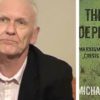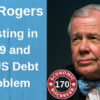076: Greg Ip on Foolproofing the Economy and Why Stability is Destabilizing
Greg Ip is one of the best-known economics journalists in the US.
He is currently chief economics commentator of The Wall Street Journal and writes about U.S. and global economic developments and policy each week in the Capital Account column and on Real Time Economics, the Wall Street Journal’s economics blog.
From 2008 to January 2015, he was U.S. Economics Editor of The Economist magazine. Greg is the author of Foolproof: Why Safety Can Be Dangerous and How Danger Makes Us Safe as well as author of The Little Book of Economics: How the Economy Works in the Real World.
“Stability is Destabilising”- Hyman Minsky
Economics:
In this episode, Greg mentions and discusses: junk bonds, capitalism, investment, growth, financial crisis, bank deposits, loans, currency, gold, exchange rates, money market funds, bank run, exchange traded funds, recessions, unintended consequences and the Paradox of Thrift.
Economists:
In this episode, Greg mentions and discusses: Paul Volcker, Hyman Minsky, Gary Gorton, Joseph Schumpeter and John Maynard Keynes.
In this episode you will learn:
-
about the theme behind Greg Ip’s latest book Foolproof.
-
when the pursuit of safety lead us into danger?
-
what forest fires have to do with Wall Street.
- about the relationship between the financial market (and its potential for a crisis) and ecological systems.
-
the way we publicly and privately try to cope with risk and danger and how those choices can create unintended consequences.
- about the Fallacy of Composition: Things you do that are safe actually end up making other people less safe.
- what American Football can teach us about the Fallacy of Composition.
- how making American Football safe with the introduction of helmets has created increased risk taking and more injuries.
- what past economic and financial crises have in common.
- how the financial system succeeded too well in making people feel their money was safe.
- how banking regulations and capital controls introduced after the financial crisis will create risks in other parts of the economy and financial markets.
-
if savings is actually bad for the economy.
-
about Keynes’ Paradox of Thrift and how savings forces others to borrow.
- whether exchange traded funds (ETFs) will be the next financial catastrophe.
- about the Peltzman Effect on anti-lock brakes.
-
how Paul Volcker‘s regulation of capital flows caused the growth of shadow banking.
-
how The Great Moderation changed attitudes about debt and how relaxed laws allowed high-risk households to borrow for mortgages.
- about Gary Gorton of Yale and his explanation for a financial crisis.
- how being present in danger can remind ourselves of the things that aren’t always safe.
- whether the finance industry could take the lessons learned about safety and regulation in the airline industry.
- why the Lehman Brothers collapse surprised many due to the US government indicating to the market that banks and mortgage companies would be bailed out.
- how German savers were much to blame for the euro crisis than their European counterparts that borrowed.
- why we continue to build cities near water which can cause devastation in the form of floods and tidal waves.
- why The Netherlands, with their ‘Room For The River’ programme, is destroying dykes and allowing their lands to flood.
- why Greg Ip is worried about the situation in China and how the stability that the government is trying to maintain will eventually lead to instability.
“If banks are limited from lending then lending activity will migrate elsewhere. We see this happening at exchange traded funds and other shadowy parts of the financial system. And you worry that risks are starting to grow there.” – Greg IP
“One way to protect ourselves against disaster is to make use of the presence of danger to remind ourselves that things aren’t always safe and to take steps that keep us safe”. – Greg IP
“What I worry about more is that the pendulum has swung too far against risk taking. And the risks that are been taken are being channeled too far in the direction of financial risk and not real economy risk – people starting new businesses or buying new homes.” – Greg Ip
“What I worry about China is that they have leadership that is worried about political and economic stability.”
Where to Find Greg Ip:
Books:
- Foolproof: Why Safety Can Be Dangerous and How Danger Makes Us Safe by Greg Ip
- The Little Book of Economics: How the Economy Works in the Real World by Greg Ip
Other Interesting Links:
- Deregulation: The Expected and The Unexpected by Sam Peltzman
- Do we really need more regulation of financial derivatives? by Merton H. Miller
- Financial Innovation: The Last Twenty Years and the Next by Merton H. Miller
- Peltzman, S. (1975). The Effects of Automobile Safety Regulation, Journal of Political Economy: 677 – 726.
- National Center for Catastrophic Sport Injury Research
- Probability of a Hazardous Material Truck Accident in New Jersey by Damodaran, M., Daniel, J. and Luke, A. C. (2002)
Podcast: Play in new window | Download


 023: Loretta Napoleoni on Financing Terrorism and the Creation of the Islamic State
023: Loretta Napoleoni on Financing Terrorism and the Creation of the Islamic State 048: Steve Hanke on Currency Boards, Moral Hazard and the Benefits of Privatization
048: Steve Hanke on Currency Boards, Moral Hazard and the Benefits of Privatization 035: Stephen Young on Being Car-Free and the Behavioural Economics of Owning A Car
035: Stephen Young on Being Car-Free and the Behavioural Economics of Owning A Car 039: David Zetland on Aguanomics, Water Scarcity, Water Wars and ‘Toilet-to-Tap’
039: David Zetland on Aguanomics, Water Scarcity, Water Wars and ‘Toilet-to-Tap’ 085: Michael Roberts on Understanding Karl Marx and His Thinking on Capitalism
085: Michael Roberts on Understanding Karl Marx and His Thinking on Capitalism 053: Helena Norberg-Hodge on Localisation, Trade Treaties and the Economics of Happiness
053: Helena Norberg-Hodge on Localisation, Trade Treaties and the Economics of Happiness 170: Jim Rogers on Investing in 2019 and the US Debt Problem
170: Jim Rogers on Investing in 2019 and the US Debt Problem 040: Rebecca Harding on Trade Finance and How Delta Economics Can Help Identify Growth Opportunities World-wide
040: Rebecca Harding on Trade Finance and How Delta Economics Can Help Identify Growth Opportunities World-wide 115: Edward Conard on The Upside of Inequality: How Good Intentions Undermine the Middle Class
115: Edward Conard on The Upside of Inequality: How Good Intentions Undermine the Middle Class 011: Steve Keen on Debunking Economics and the Misinterpretation of Keynes
011: Steve Keen on Debunking Economics and the Misinterpretation of Keynes